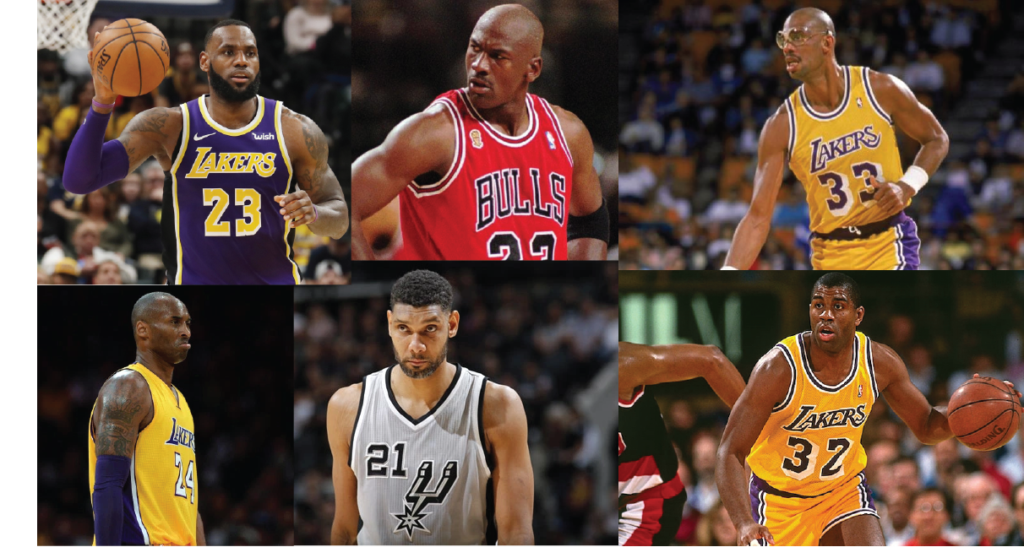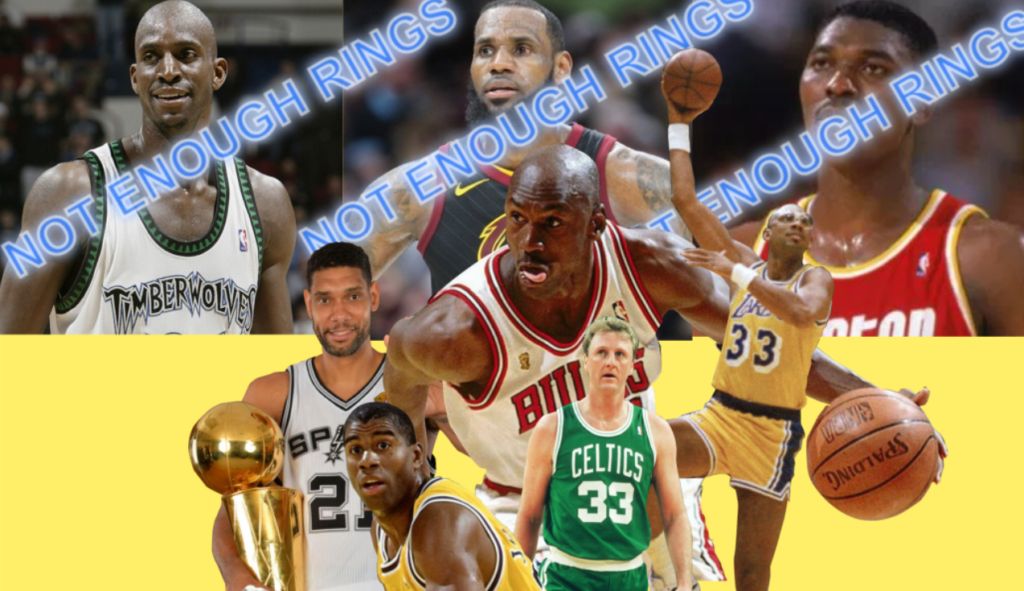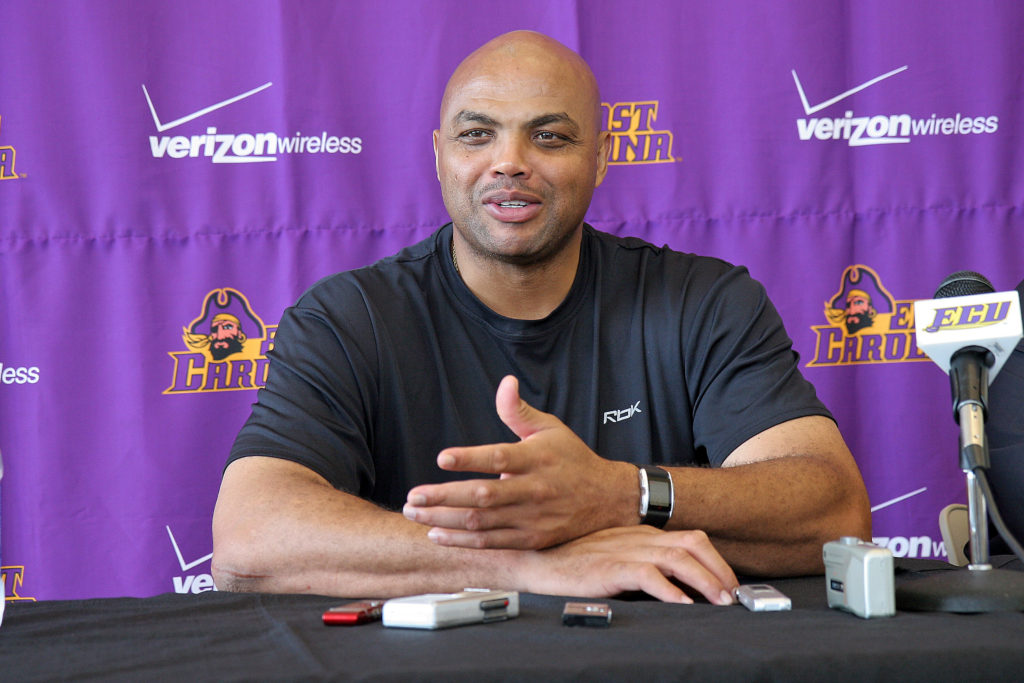Imagine that in the future, much of the world was destroyed in a massive flood – and for some reason, instead of trying to discover and research ancient artifacts and texts that give us insight and useful information about our past and history, we instead decided to spend our time recalling who the best NBA players were.
And then imagine if in this scenario, all we had were championship rings, and players names attached to them. Well, in this case, one would obviously use rings to measure players’ greatness, since that’s the only metric we have. (So naturally, Bill Russell Michael Jordan would be first, and the rest would be the following in some order; Magic Johnson, Shaq, Kobe, Tim Duncan, Larry Bird, LeBron James, et cetera et cetera.) In this case, we don’t have footage of the players, or stats, analytics, team records, rosters, or anything else that can give us a detailed analysis about the player’s teammates, competition, playstyle, impact, and performances. So it makes perfect sense to use rings.
What doesn’t make sense is why in the year 2019, when we have access to hundreds – if not thousands – of hours of game footage of most players from 1980 onwards, along with their stats, game logs, rosters, schedules, team records, and advanced stats, we STILL insist on using rings as the measure of a player’s greatness.

No you dork. I actually don’t use analytics – I don’t really feel strongly about them either way. Also, watching anime isn’t even nerdy anymore – many NBA players watch it, unless you think they’re nerds too.
Er um… anyway… on to the main point. Rings are not a great way to grade players. I’m not saying they are a bad way – after all, their tends to be a solid correlation among great players and winning at least 1 ring, than otherwise. But here’s why it shouldn’t be used:
Rings don’t tell the whole story. Rings don’t account for factors that are outside the player’s control, like quality of teammates, injuries of teammates, and competition. Rings don’t even tell how well a player played – hence why we’ve seen top 10 players like Kobe be able get a ring without even playing well sometimes (like in the 2000 Finals. Yes he was injured, but that actually proves my point. Him being injured and not playing well still didn’t prevent him from winning a ring), meanwhile other players like LeBron can average 35 and lose.
Essentially, if Player A scores 50 points, passes the ball well, and loses, while Player B on the other team scores 25 and his team wins, are we gonna say Player B is better than player A? The very fact that a player on one team can outplay a player on the other team and lose is the perfect example of why rings are not a good metric.
An individual player’s performance is only a fraction a team’s ability to win a game. There are other variables.
In fact, using rings can actually devalue how great certain players are. Case in point, Jordan. Jordan is the greatest – but it’s not just because he has 6 rings. That’s only a fraction of it. Jordan is the greatest because he is one of the most-skilled two-way players ever. He was a lockdown defender and scoring champion – with excellent efficiency – and was incredibly clutch and fearless. Although not known for his passing, when Jordan played point guard in 1989, he averaged 32/8/8 on 54% shooting, better season stats than LeBron, Kobe, and Bird ever put up. His only weakness was three-point shooting, which, given his amazing ball-handling, dribbling, shot-creation, and overall low-priority for 3-PT shooting in his era, didn’t really hurt him.
Yet despite that, most people who praise Jordan just say “6-0”. Which, as you can tell, actually is a disservice to his greatness. It’s part of why people are still able to put other players like LeBron ahead of him (because they can point the circumstances of his rings vs LeBron’s rings). As where if you don’t neglect actual pure basketball skill and technique, Jordan comes out ahead.
Rings are a team accomplishment. The best team/best roster usually wins. Michael Jordan is excellent, as I stated. He is better than LeBron James – but I and everyone else has to be honest here; do you see him winning the 2018 Finals with that Cavaliers roster against a team that has 4 All-Stars in their prime? (Hint: that team is the Warriors.)
While playing with Kevin Love, Jordan Clackson, Larry Nance Jr, and this guy?

This isn’t football, where a great scheme wins out. In the NBA, where there are only 5 players on the court, the team with the best roster wins out. And if your roster is significantly worse, your individual greatness matters even less.
Look at the famous “Carry-jobs”; Hakeem in the 90s, Duncan 2003, Dirk 2011: their actual Finals opponents weren’t too overpowered. The 2011 Heat saw Wade get injured halfway through the series, and LeBron choke. Along with them having little depth that first year. The 95 Magic’s roster had a good starting 5, but that was it. Along with the fact that that Magic team was VERY young and inexperienced – and it showed when Nick Anderson’s missed free throws hurt their mentality that badly.

No, that’s not what I’m saying. And stop yelling at me (and stop being so condescending while you are at it too).
What we should do to rate players instead is to use neither rings, nor analytics. We should rate players based on two metrics: Their Skillset, and Relative Production is. Relative Production is a termed I’ve coined to refer to how well a player maximized their situation. The “situation” takes into account how good their supporting cast was, how strong or weak their opponent was, how strong or weak the “era” was, rules, and the like. The production is merely just how well that player played given said situation. Did he carry a bad team far in the playoffs? Did he underachieve with a good squad? Did he average 30 while playing good, team ball? Or was a he volume chucker that took held his team back? Skillset is obvious – their basketball arsenal and technique. Inside scoring, mid-range scoring, 3-pt scoring, passing, court vision, post-game, post footwork, post defense, perimeter defense, pick & roll, etc. are all examples of this.
As you can see, this approach is actually the best way to judge a player. It clearly values winning (relative production). But it also provides context. Because, as said before, a player loses in the Finals is very rarely the sole reason they lost. It’s fun to think we live in a just world where playing hard guarantees a win everytime. But that’s not how the world works. If the odds are too stacked against you, you won’t win. No matter how well you play. Especially in the NBA.
There’s a reason why Michael Jordan didn’t win the Finals every year of his career.

In the late 80s, he lost to the Pistons 3 straight times. And here’s the real question; what was actually different between Michael Jordan in 89, 90, and in 91 – the year he won his first ring?
His play and production weren’t really different. What changed that he got over the hump? Well, look at his supporting cast. In 88, Pippen was a 2nd year players, young gun. Pippen went from averaging 8/4/2 to 18/7/6 when they won in 91. That’s pretty important. In that 91 season, Thomas was injury riddled and played only 48 games; in the playoffs that year, he posted his worst playoff averages of his career. In the ECF, he averaged around 12 points and 6 assists – way below his caliber.
This isn’t to take credit away from Jordan. It’s simply to show that rings don’t tell the whole story. They don’t take into account competition, injuries, teammates, and various other factors that are outside the player’s control.
So with this, I hope that you can be convinced that Rings should not be your end-all, be-all argument. They are not a good way to “nitpick” between great player,s because they are quite possibly the most non-specific, non-descriptive- non-informative stat. Put it this way:
Kobe Bryant got a ring in the 2000 Finals where he averaged 15 points. Jordan got a ring in the 1993 Finals where he averaged over 40 points. See what I mean? I’m not bashing on Kobe – he did great work to get the Lakers to Finals in the earlier rounds of the playoffs. It just shows how Rings are not the best metric to use to grade players. They don’t tell the whole story. It’s borders on misinformation.
Leave your comments below please.





